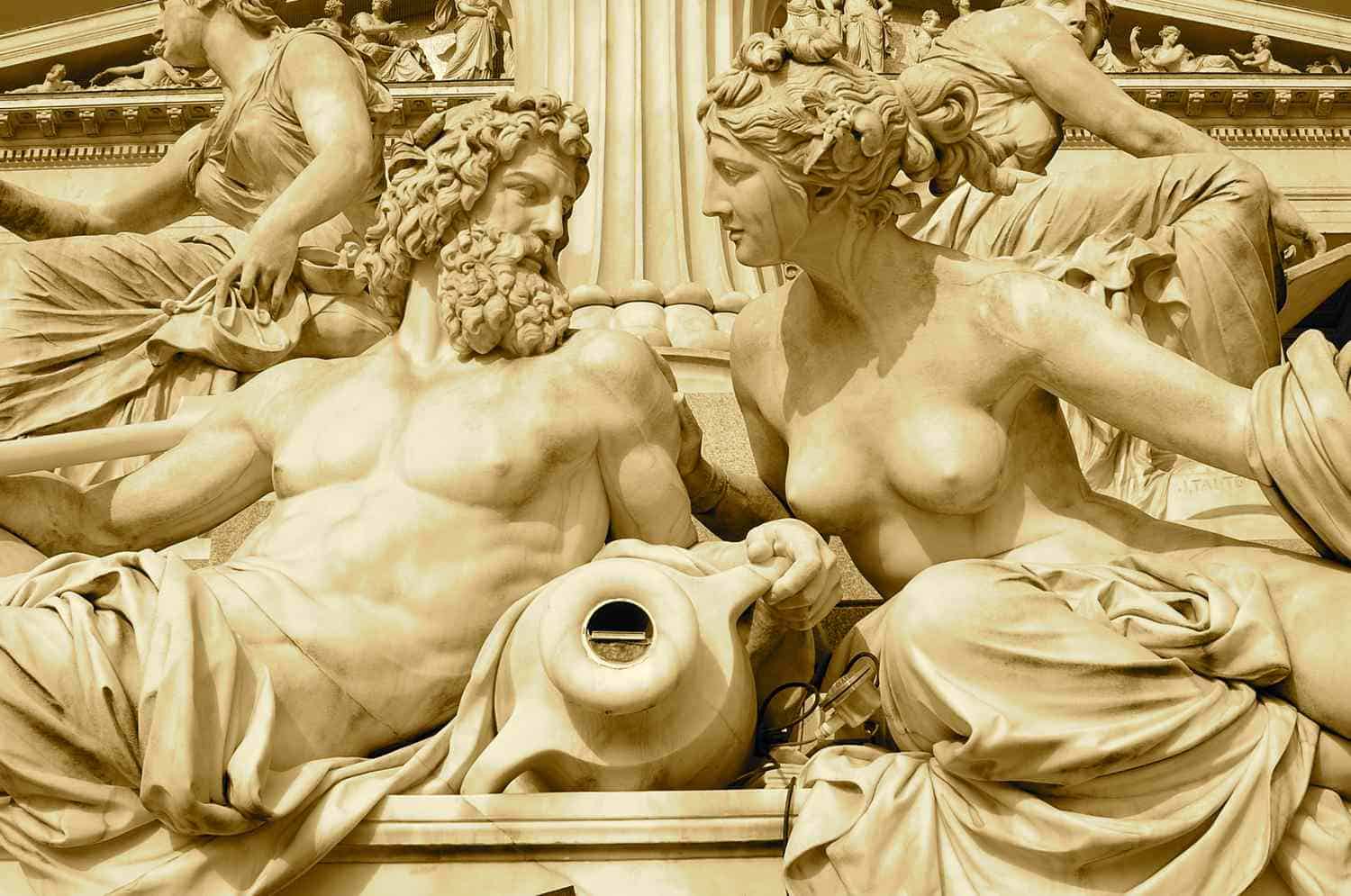Hera, the Greek goddess of love and marriage, is an influential figure in Greek mythology with a rich history and intriguing myths. As one of the twelve Olympian gods and goddesses, Hera was revered by ancient Greeks for her beauty, strength, and wisdom.
Her story is filled with tales of jealousy, rivalry, passion, and motherhood that continue to captivate audiences today. Despite her popularity as the queen of the gods and goddesses in ancient Greece, Hera’s image has evolved to reflect changing attitudes towards women and relationships.
In modern culture, she is often portrayed as a feminist icon who defies traditional gender roles and challenges patriarchal power structures.
This article will explore Hera’s origins, relationship with Zeus and other gods/goddesses like Aphrodite along with her children/family life; delve into her many myths and legends; examine her symbolism & meaning in modern culture; discuss her legacy in Greek mythology & beyond; provide fascinating facts/trivia about this great deity.
The Mythological Origins of Hera
Hera’s mythological origins can be traced back to the Titans, whom Zeus and his siblings overthrew. She was the daughter of Cronus and Rhea, both Titans themselves.
When Zeus became the ruler of the gods, he chose Hera as his queen and wife. As the goddess of love and marriage, Hera was known for her beauty and loyalty to her husband. However, she was also known for her jealousy of Zeus’ many infidelities.
Her wrath could be swift and fierce towards those who dared to cross her or threaten her marriage.
Despite this reputation, Hera was also revered as a protector of women in childbirth and a patroness of marital fidelity.
Hera as the Queen of the Gods and Goddesses
You may be surprised to learn that Hera was a Greek mythology ruler of all gods and goddesses. She was a powerful queen who commanded respect and admiration from everyone around her.
Hera, the daughter of Cronus and Rhea, wasn’t only the goddess of love and marriage and the protector of women and children. As the wife of Zeus, Hera played an essential role in maintaining order among the gods.
Despite her husband’s numerous infidelities, she remained faithful to him and fiercely protected their union.
Her power extended beyond her marital relationship as she oversaw childbirth, fertility, and domestic harmony matters. It’s no wonder that Hera was highly respected by both mortals and immortals for her strength, wisdom, and devotion to duty.
Hera’s Relationship with Her Husband, Zeus
In a committed relationship, staying loyal and faithful is essential, as Hera did for her husband, Zeus, despite his indiscretions. As the goddess of marriage, Hera valued the sacredness of the bond between two people and was determined to uphold it.
Although Zeus was known for his infidelities, Hera never gave up on their marriage and continued to love him unconditionally. Despite their challenges as a couple, Hera and Zeus shared a deep connection that lasted throughout their lifetimes.
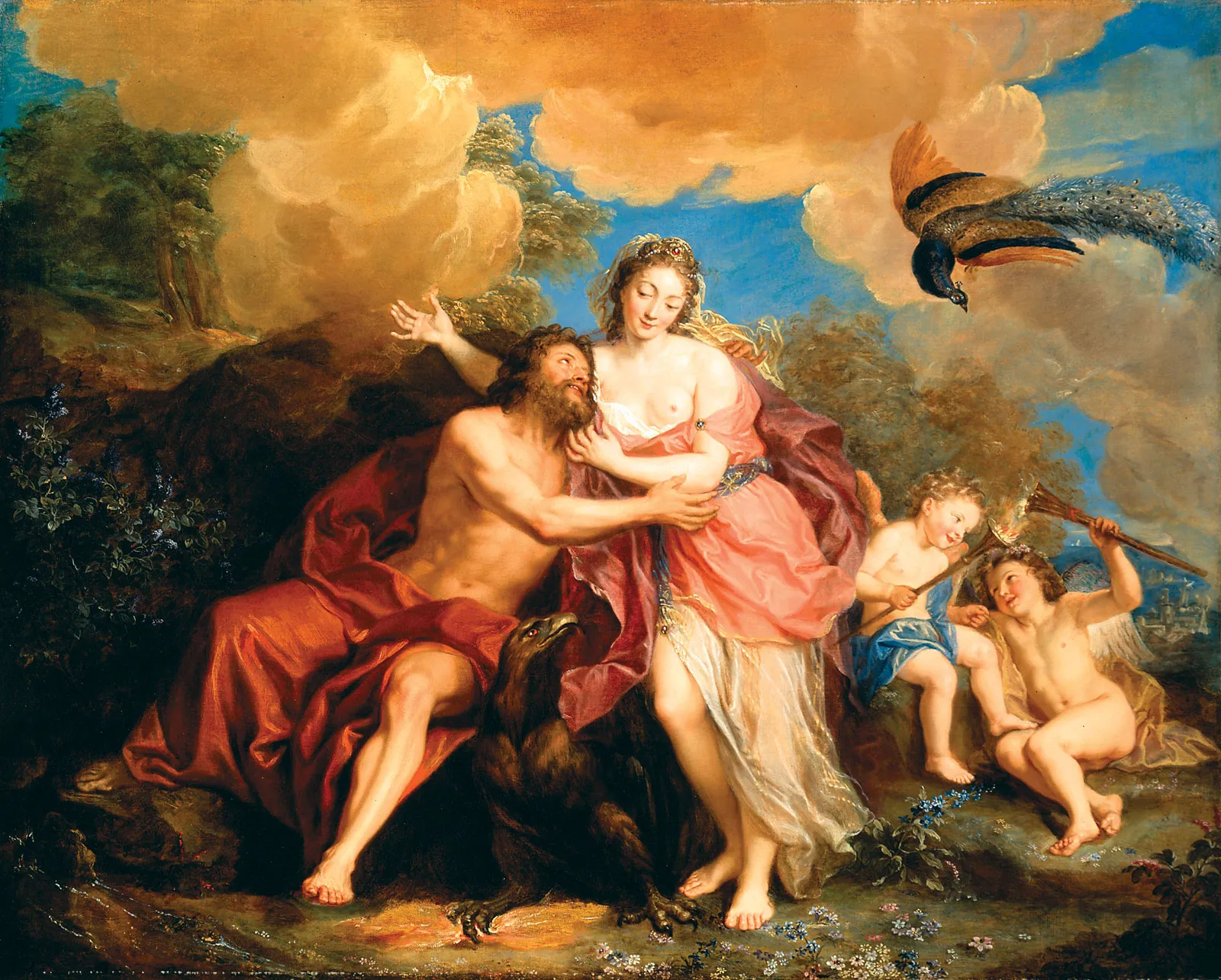
Here are some interesting facts about their relationship:
- According to Greek mythology, Zeus fell in love with Hera at first sight.
- To win her over, he transformed into various animals, such as cuckoo birds or bulls.
- Despite being married to Zeus, Hera never had any children with him out of jealousy towards his illegitimate children.
- Some legends suggest that Zeus was unfaithful because he feared losing his power if he didn’t continue having affairs.
- Despite all this turmoil, Hera remained devoted to her husband and even helped him in times of need.
Their story proves that true love can withstand any challenge thrown it’s way.
The Jealousy and Rivalry of Hera and Aphrodite
Now, let’s dive into the intense rivalry between Hera and Aphrodite and how their jealousy played out in Greek mythology.
As the goddess of love and marriage, Hera was naturally protective of her domain and resented any other deity who tried to infringe on it. This included Aphrodite, the goddess of love, beauty, and sexuality.
The two goddesses were known for their fierce competition over men, with Hera often trying to thwart Aphrodite’s attempts at seduction.
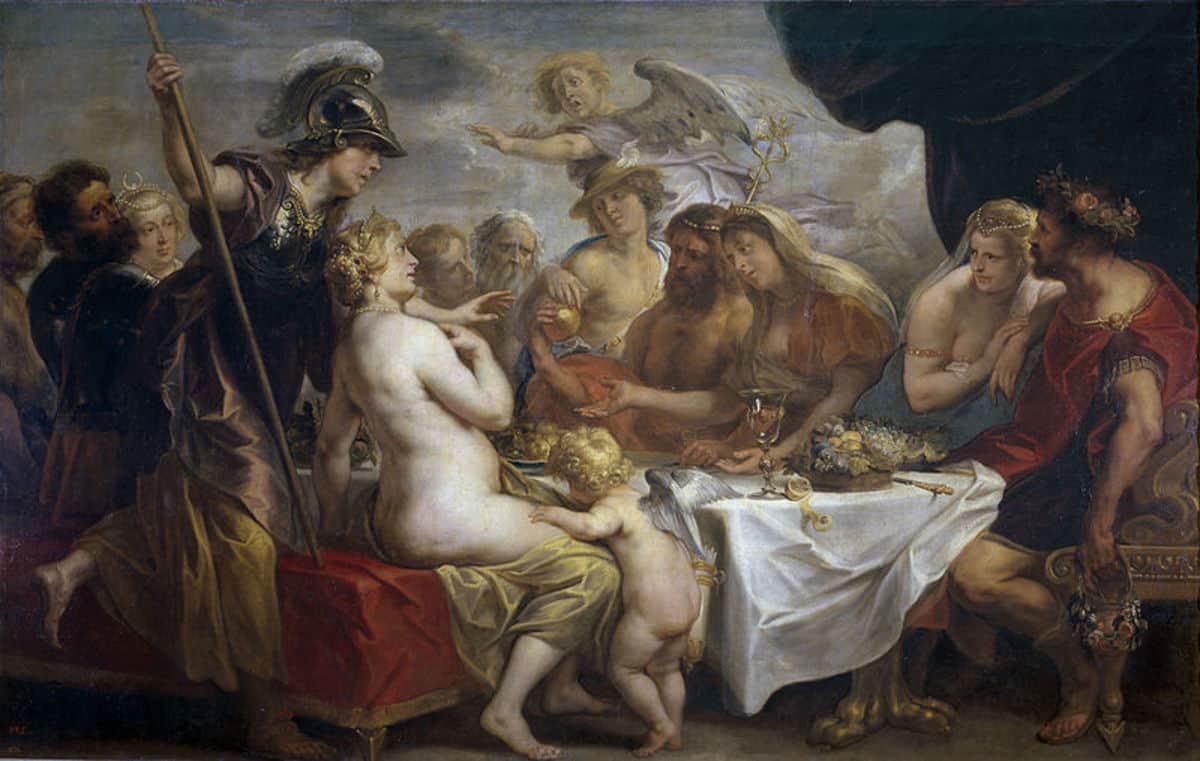
Their rivalry reached its peak during the Trojan War. When Paris was tasked with choosing the most beautiful goddess, Hera and Aphrodite vied for his favor by offering him bribes. Ultimately, Paris chose Aphrodite as the winner after she promised him the love of Helen of Sparta.
This only fueled Hera’s anger towards Aphrodite even further, leading her to become a fierce opponent of Troy throughout the war. Despite their differences, both goddesses were powerful forces in Greek mythology who commanded respect from mortals and immortals alike.
Hera’s Children and Family Life
Look at the family life of Hera and her offspring, including Ares and Hephaestus.
Hera was married to Zeus and had three children: Ares, the god of war; Hebe, the goddess of youth; and Eileithyia, the goddess of childbirth. However, there were claims that Hephaestus was her son born without a father.
Hera’s relationship with her children was complicated. She loved them deeply but could be overprotective at times. Her son, Ares, was often favored by his mother as he shared her love for conflict and battle.
On the other hand, she sometimes disowned Hephaestus for being born physically imperfect. Despite this, she still sought his help, creating weapons for battle when needed.
Hera’s family life was full of drama and tension typical of any Greek mythological family story.
Hera’s Role in Greek Society and Religion
As a prominent figure in Greek mythology, Hera played a crucial role in shaping the beliefs and practices of ancient Greek society. She wasn’t only the queen of the gods and the goddess of marriage and fertility.
Her role as the protector of women during childbirth made her an essential deity for women seeking to conceive or deliver healthy babies. Hera’s presence was felt in Greek life, from politics to religion.
She was worshiped at numerous temples throughout Greece, where people would come to seek her blessings and protection. Moreover, as the goddess of marriage, she oversaw wedding ceremonies and blessed couples with marital happiness and longevity.
In this way, Hera’s influence extended beyond religious spheres into societal norms regarding love, fidelity, and family life.
Hera’s Depictions in Art and Literature
You might be interested to know that Hera was often depicted as a regal and influential figure in art and literature. She had a crown or diadem on her head and was often accompanied by peacocks. Hera was seen as the ultimate symbol of femininity and grace; her beauty captivated all who looked upon her.
Her statues were often placed in temples dedicated to her name, where she was worshipped as the goddess of love, marriage, childbirth, and family life.
In literature, Hera is portrayed as a loving wife to Zeus and a fierce protector of her interests. She is also known for her jealousy towards other women who caught Zeus’s eye, sometimes leading to conflict among the gods.
Despite this flaw in her character, Hera remained an essential figure in Greek mythology. It was believed that through her protection over married couples, she ensured the continuation of society itself.
The Many Myths and Legends of Hera
There are countless tales of Hera’s power and influence in Greek mythology, showcasing her as a multifaceted deity with admirable qualities and flaws. Some of the most well-known myths and legends associated with the goddess are mentioned below.
- The story of Io: In this tragic tale, Zeus transforms one of his lovers, Io, into a cow to hide her from his jealous wife. Hera eventually discovers the truth and torments Io by constantly sending a gadfly to sting her.
- The Labors of Heracles: As punishment for being born out of wedlock from one of Zeus’ affairs, Hera despises Heracles (also known as Hercules) and makes it her mission to make his life difficult. She sends him on dangerous quests as part of his twelve labors.
- The Judgment of Paris: When three goddesses – Hera, Aphrodite, and Athena – ask Paris which is the most beautiful, he chooses Aphrodite after she promises him Helen of Troy. This ultimately led to the Trojan War.
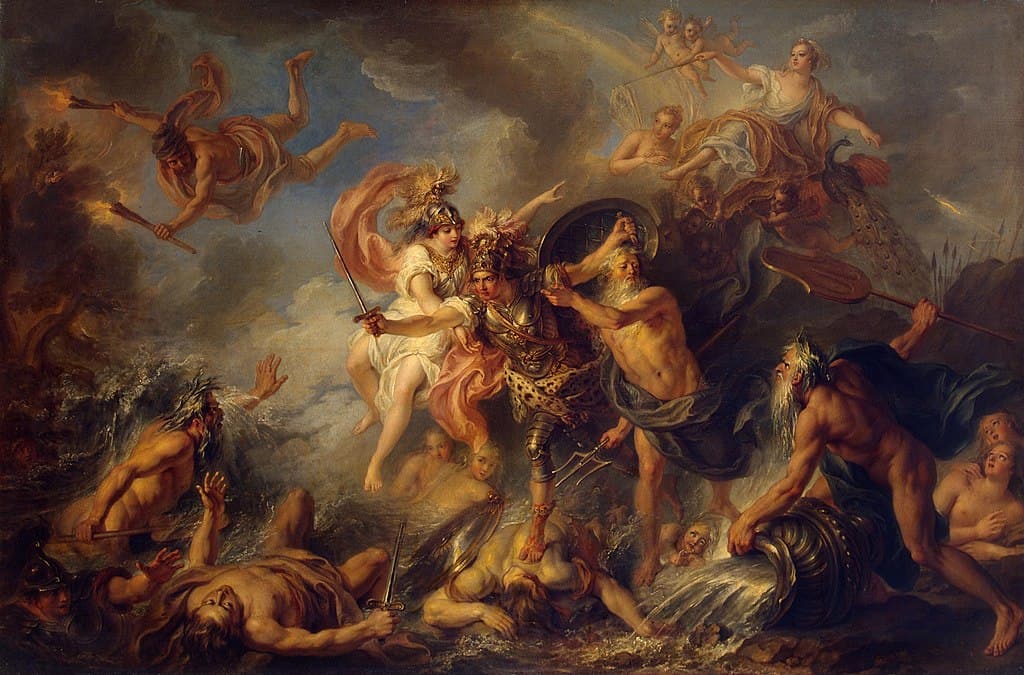
Hera’s myths demonstrate her strength and complexity as a goddess who isn’t easily defined by simple labels or stereotypes. Despite being portrayed as vengeful at times, she also embodies virtues such as loyalty, commitment, and devotion in her role as protector of marriage.
Hera’s Symbolism and Meaning in Modern Culture
Explore how modern society continues to be influenced by the symbolism and significance of Hera as her legacy endures through various cultural representations and interpretations.
The Greek goddess of love and marriage is often referenced in popular media, such as books, movies, and TV shows, that portray strong female characters who embody her qualities. Her peacock symbol has become popular in fashion design and home décor.
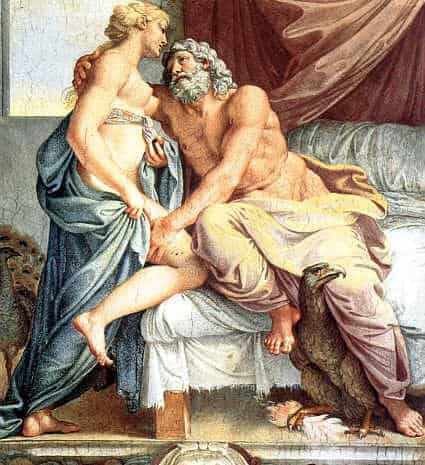
Many people also name their daughters after Hera or incorporate her name into their own. Hera’s influence extends beyond just her namesake and decoration; she remains essential for those seeking guidance in love and relationships.
Some even turn to Hera for help with fertility or childbirth. Additionally, many couples reference Hera in their wedding ceremonies to honor her role as the goddess of marriage.
Through these varied expressions of devotion, it is clear that Hera’s legacy is still alive today and will continue to inspire future generations.
The Legacy of Hera in Greek Mythology and Beyond
From epic battles to tales of betrayal, Hera’s influence on Greek mythology and beyond is undeniable. As the queen of the gods and goddesses, her legacy continues to be felt today in various ways.
Here are a few examples:
- Her name has become synonymous with marriage, as she was considered the patron goddess of this sacred institution.
- In art and literature, Hera often symbolizes power and strength. She is often depicted wearing a crown or holding a scepter.
- Many stories depict her fiercely protective of her family and willingness to go to great lengths to protect them from harm.
- Despite being known for her jealousy, Hera embodies loyalty and devotion that continue to inspire women today.
- Hera remains an essential figure in ancient mythology and modern culture. Her legacy reminds us of the power of love, loyalty, and devotion in our lives.
Fascinating Facts and Trivia about Hera
- As we delve deeper into Hera’s mythology, get ready to learn some fascinating facts and trivia about the queen of the gods herself.
- Did you know that Hera was born from Cronus and Rhea, making her one of the six children their father swallowed?
- She was also known as the goddess of marriage and childbirth, but interestingly enough, she wasn’t always a faithful spouse.
- Hera had multiple affairs throughout her time in Greek mythology, including with Ares (the god of war) and Zeus’s brother Poseidon.
- Another fascinating fact about Hera is that she was often depicted wearing a crown or headdress made out of lotus flowers.
- This symbolized her association with purity and fertility and her connection to the Nile River in Egypt, where lotus flowers were abundant.
- Additionally, it is said that when two lovers make an offering at a temple dedicated to Hera, they will receive blessings for their relationship from the goddess herself.
- These are just a few examples of the intriguing details surrounding this complex and influential figure in Greek mythology.
Conclusion
Hera remains a prominent figure in Greek mythology, known for her power, beauty, and jealousy. She was often portrayed as a protector of marriage and childbirth, as the wife of Zeus and queen of the gods and goddesses. Despite her sometimes negative traits, she is praised for her role as a mother to several important figures in Greek mythology, such as Hebe and Ares.
Hera’s legacy inspires modern culture with her symbolism representing love, loyalty, and commitment. She has been depicted in various forms of media, such as literature, art, and film. Overall, Hera’s complex personality adds depth to Greek mythology while reminding us of the complexities within ourselves.

